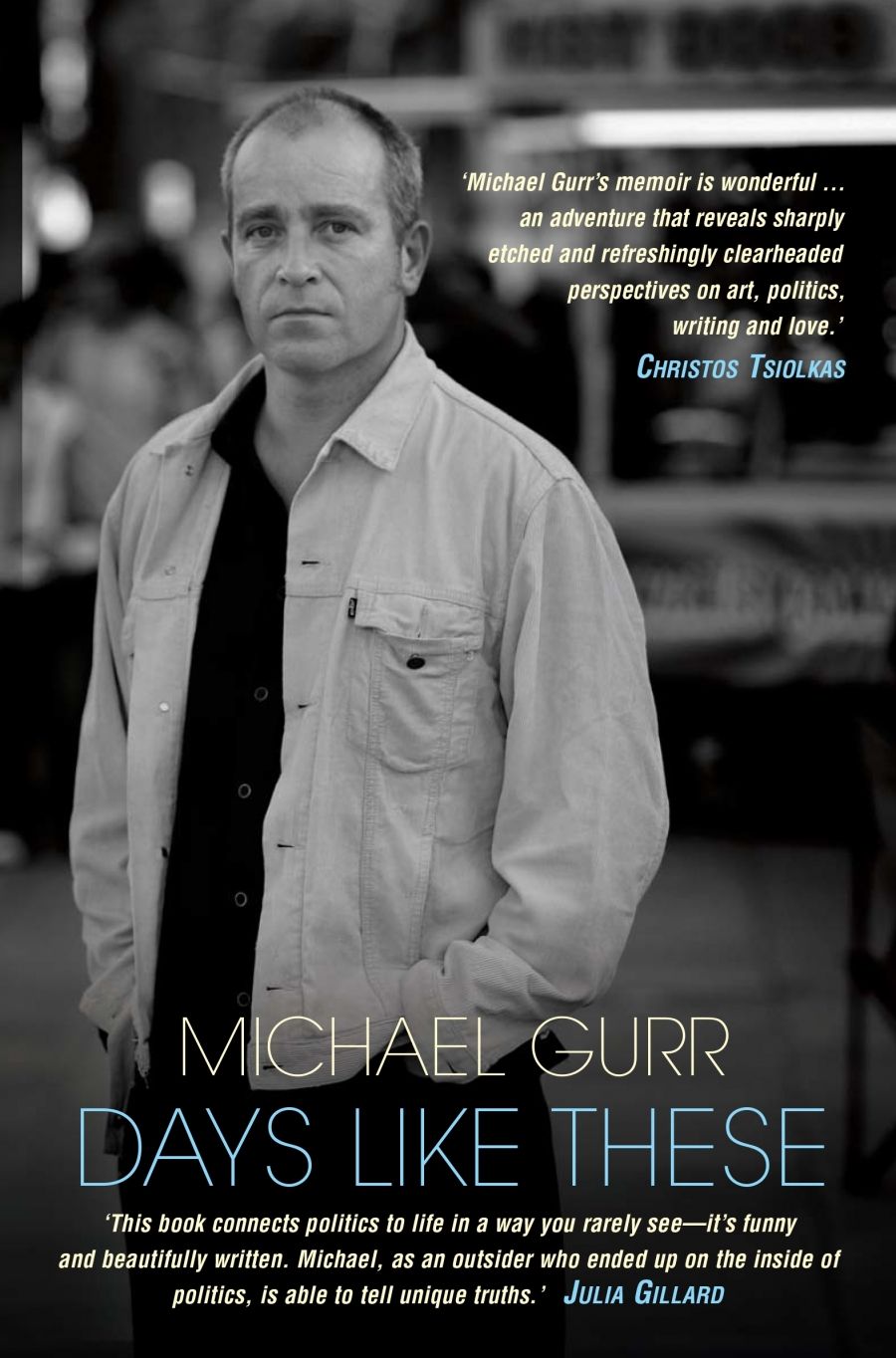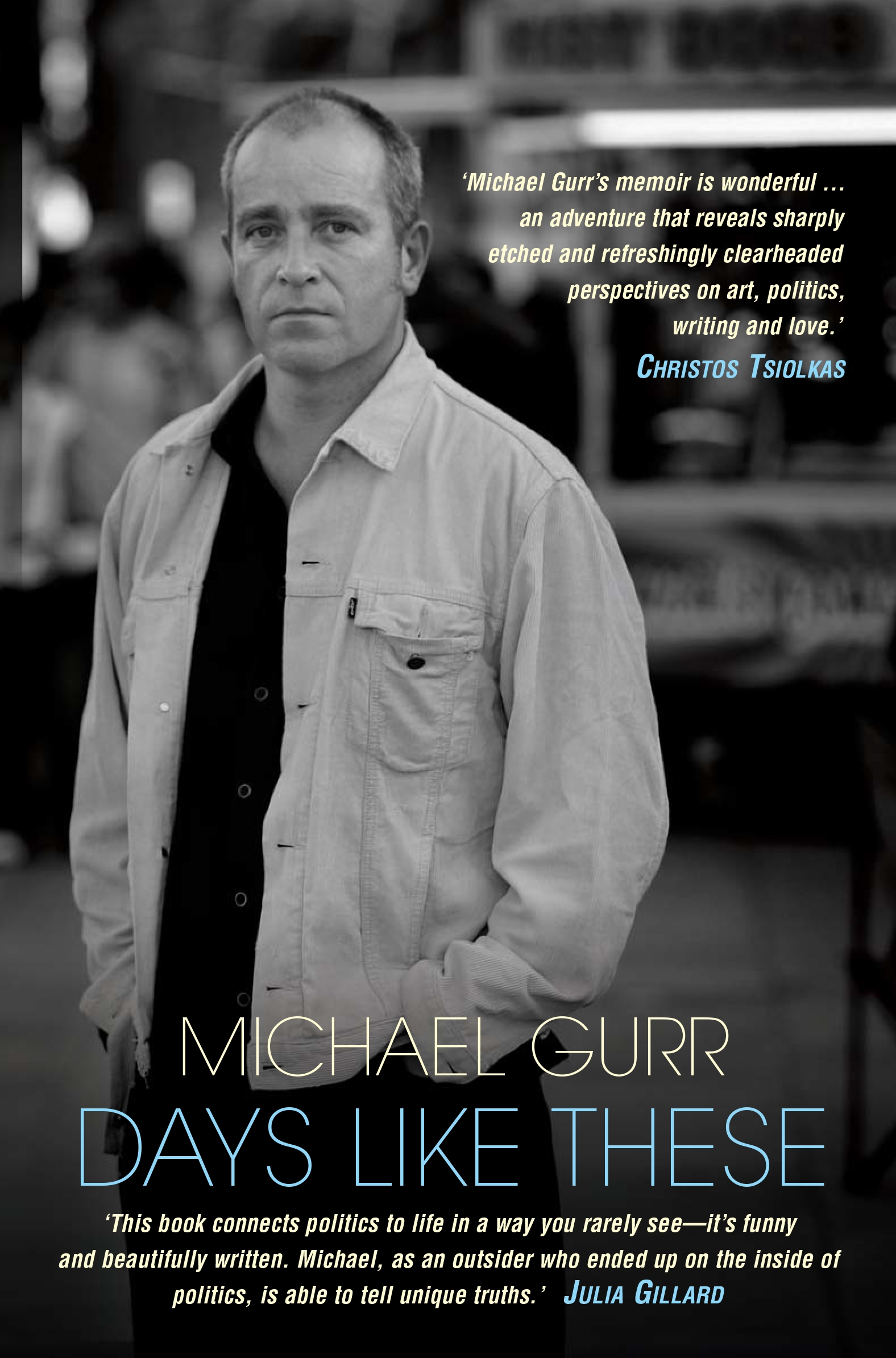
- Free Article: No
- Contents Category: Memoir
- Review Article: Yes
- Article Title: The legendary ‘Fuck!’ speech
- Online Only: No
- Custom Highlight Text:
Michael Gurr was Victorian Premier Steve Bracks’s first senior speechwriter. I am his latest. Gurr worked for Victorian Treasurer John Brumby when he was leader of the state opposition in the mid-1990s. So did I. Gurr wrote the launch speeches for Steve Bracks’s successful 1999 and 2002 state election campaigns. As I type this review, I am also, coincidentally, in the midst of ballpointing my way to the summit of my first draft of the launch speech for the 2006 campaign (a campaign that I cannot know the result of as I type, but you will already know as you read this). The coincidences do not end there.
Gurr’s speech for the 1999 campaign – one made famous by the unexpected defeat of Premier Jeff Kennett – was launched in Ballarat. The 2006 campaign will be launched in Ballarat. Gurr is known in Labor circles as a ‘creative type’ (read: prolific, award-winning playwright of works such as Jerusalem and Sex Diary of an Infidel). I am also known as a ‘creative type’ (novelist and poet). And yet, despite all these coincidences and intersecting lines, not to mention the backbench of associates we have in common, Gurr and I had never met when a speech request landed on my desk a while back with the title ‘Michael Gurr book launch’. Of course, I knew of Gurr. Sort of.
- Book 1 Title: Days Like These
- Book 1 Biblio: MUP, $24.95 pb, 296 pp
- Book 1 Cover Small (400 x 600):

- Book 1 Cover (800 x 1200):

Gurr’s speech for the 1999 campaign – one made famous by the unexpected defeat of Premier Jeff Kennett – was launched in Ballarat. The 2006 campaign will be launched in Ballarat. Gurr is known in Labor circles as a ‘creative type’ (read: prolific, award-winning playwright of works such as Jerusalem and Sex Diary of an Infidel). I am also known as a ‘creative type’ (novelist and poet). And yet, despite all these coincidences and intersecting lines, not to mention the backbench of associates we have in common, Gurr and I had never met when a speech request landed on my desk a while back with the title ‘Michael Gurr book launch’. Of course, I knew of Gurr. Sort of.
Despite the fact that I was not in Australia at the time, I knew of his involvement in that 1999 campaign. Then again, despite the fact that I was in Victoria at the time, I was hazy about his involvement in the 2002 landslide, having spent most of that Spring Carnival driving from country racetrack to country racetrack in my capacity as the press secretary for Rob Hulls, Victoria’s attorney-general and then-minister for racing. Moreover, I knew of Gurr’s legendary ‘Fuck!’ speech: a yarn that veterans of the 1999 campaign still, when the moon is full and the beer cold, recount with such incredulity that I had, on occasion, questioned the veracity of the anecdote.
Before coming to the ‘Fuck!’ speech, however, I first need to proffer a confession about my speech: the ‘Michael Gurr book launch’ speech. The premier had been invited to do the honours. The happy occasion was set to be held in the quadrangle outside the Malthouse Theatre – the setting of many a Gurr play’s premiere – during the Melbourne Writers’ Festival, and I tried harder than I commonly would to write an uncommonly good speech to mark the occasion. Not just a good speech. An impressive speech. The kind of purple prose that might catch the ear of the Premier’s First Speechwriter. And the First Speechwriter, being a ‘creative type’, would know that the Latest Speechwriter was a fellow traveller – another creative type – and, even if they did not clap eyes on each other during the book launch, the First Speechwriter would know, know in his bones, that his charge was safe in the Latest Speechwriter’s hands. Cue curtain. Cue applause. Crowd hastily exits to quaff free vino and bubbly. Oh, the conceit before the fall.
I submitted my speech, which, although only 628 words in length, zinged. Begged to be read aloud. Rather than describe the speech, allow me to vouchsafe a sample: ‘Speechwriters are misunderstood – or misread – for a very good reason. They tend to be a little odd. Still, as premier I have promised to govern for all Victorians – even speechwriters. And there is no doubt that being misunderstood can do strange things to the human spirit – just look at the career choices of former speechwriters such as Tony Abbott and Alan Jones.’ Zing … followed by the sound of paper shredding. You see, not long after I popped my zinger of a speech into his in-tray, the premier came to see me. He said it was a good speech. He said he liked it. He said he wouldn’t deliver it. He said he hoped I wouldn’t mind. Such is a speechwriter’s life. Which brings me to Days Like These.
This is a strange book. Strange in that it defies the kind of easy categorisation of which marketing departments seem increasingly fond. It is not a ‘political’ book, yet is political. It is not a ‘theatre’ book, yet is theatrical. It is not a ‘memoir’, yet is memoirish. It is simply a good – no, very good – book to read. Insightful and incisive, funny and serious, personal and political, Days Like These is a Trojan Horse of a book. It first entertains the reader with stories that also inform via their penetrating insights into the lamentable state of our national affairs and national theatre.
If Days Like These can be defined as anything, though, it is as a ‘writer’s book’: a book by a writer about writing on a canvas that is both personal and public, political and artistic; a book that, in parts, reminded me of David Mamet’s Three Uses of a Knife (1998) in the way it vivisects the nature of drama and writing for the stage. That is not to say Days Like These is only for dramaturges or political apparatchiks. On the contrary, its style and structure, disarmingly open and deceptively simple, deserve a wide audience.
Gurr, in a series of diary entries – dated, but not sequential – tells, through a series of vignettes and reflections, the story of his political and artistic development thus far (he is only forty-five). Days Like These is, as Gurr says in his introduction, ‘mostly about work’. And what work it has been: a teenage playwright-in-residence at the Melbourne Theatre Company, an apprenticeship under playwright Ray Lawler and director John Sumner, a professional acquaintanceship never quite consummated with stage actress Zoe Caldwell, umpteen professionally produced plays in Australia and overseas, a Waiting for Godot experience at the Cannes Film Festival in 1986, working with Actors for Refugees to assemble the stories of refugees and asylum seekers into the play Something to Declare, acting as the ‘disposable nappies dad’ in a television commercial; not to mention the speechwriting.
What makes Days Like These work, though, is the style of writing and the substance of its author. Gurr, to a fault, offers an open and accountable appraisal of his conduct as a playwright and speechwriter. Why did he refuse to visit the Maribyrnong Detention Centre? Why didn’t he want someone to sign for the deaf during then-Opposition Leader Bracks’s 1999 campaign speech? Why didn’t he want to be photographed holding a bomb to publicise his play Crazy Brave? All is revealed.
Better yet are the Gurr zingers. This book offers a plethora of quotable quotes for speechwriters, those shallow beasts, to underline, whether the subject is war (‘the story of war has been taken over by hollow men who you suspect would have been the first collaborators’), poetry (‘literature’s fart in the lift’) or speechwriting (‘Political speech-writers dream the Gettysburg address and wake up to the Cheltenham Chamber of Commerce’). Ultimately, however, this is a book about struggling, during cynical times, not to lose faith. As Gurr writes, in a passage that contains the title of this auto-biographical stocktake: ‘On days like these a dose of unshakeable belief would come in very handy indeed.’
And the ‘Fuck!’ speech? In the final days before the 1999 poll, Bracks asked Gurr to write two speeches: one for a loss (which every political soothsayer predicted), and one for dethroning Kennett (which no one predicted). ‘I tell him,’ Gurr writes, ‘I’ve got one in each pocket. And the one in the good pocket just says “Fuck!”’ On the night of the poll, Gurr presents the laser-printed version of the ‘Fuck!’ as a joke, which, as the night wears on and the impossible win becomes possible, becomes prophetic. (And, no, the speech was not delivered on the night.)
I finally met Gurr at the launch of Days Like These. It was just after the premier had delivered an off-the-cuff speech that was warm and personal, and therefore far more authentic and superior to the zinger I had diligently tapped out on my PC. I asked Gurr about the ‘Fuck!’ speech. He told me that ALP staffers kept asking for the copy of that one-word speech. I also told him my favourite political bit in the book was his description of giving Bracks a hug for luck on the day of the 1999 campaign launch, an event he likened to opening night: ‘It’s one of those failed men’s hugs where neither of you knows which side to put your head.’
In a week I will be driving up to Ballarat for the 2006 campaign launch. I’ve asked Michael Gurr whether he wants a ride.


Comments powered by CComment